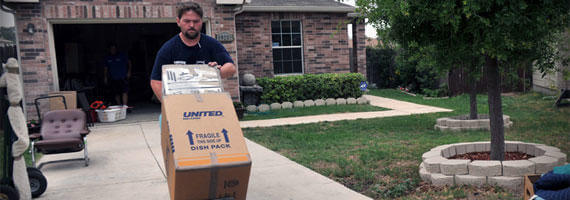We are rapidly approaching the main PCS season for military families and are already into that time of year where families learn where they are moving to this summer.
As the Facebook administrator for American Military Families Autism Support (AMFAS), and as the parent of a spectrum child myself, I field dozens of questions related to this topic. How do I make sure where we’re headed can handle my child’s needs? What kind of housing should I pick? Will there be the right providers?
Relocating with a special needs child can be a headache, but, here are some tips that might make the process a little less stressful.
Exceptional Family Member Program (EFMP)
Is your child enrolled in the Exception Family Member Program (EFMP) in your branch? If your child has a qualifying condition, such as autism spectrum disorder, enrollment is mandatory.
Even though this program is supposed to help you, the biggest tip I can give you is to not assume that the process will work properly, or as intended, for your family.
Check that your EFMP paperwork has the full details of what your child needs, including medical specialists and frequency, special education provisions, housing needs (such as locks or fencing for safety or accessibility needs) and therapies – including speech, OT, PT and ABA, as applicable.
Research your new hometown
Ask family, friends or seek out other sources (American Military Families Autism Support has ‘Groups’ in many base locations) where you can find out information about the availability of services your child may need.
Ask questions! Ask about wait times and number of providers that take Tricare patients.
Call providers to ask about their wait times, number of hours they can offer your child and most importantly, for school age children, the availability of after school appointments -- this can be a huge deal, or even a deal breaker.
Ask questions as to school districts in the area to which you’ll be moving. There will always be good and bad districts and good and bad schools within those districts.
Talk with the School Liaison Officer at your potential gaining base. Keep in mind they often will not give you specifics regarding “bad” districts, but it’s worth asking if other families seem to be happy with a particular district or have encountered problems getting the services their children need to succeed at school.
Call the schools! Talk with special education staff and ask them about programs, class sizes, staff to student ratios, as well as provisions such as those for Twice Exceptional and Gifted children (these programs fall under Special Education).
Do you have concerns?
Feeling like your new base can’t support your child’s needs? Don’t be afraid to speak up! The assignments branches expect there will be some locations that don’t work for a family and will come up with another location if one is unsuitable. Sometimes the EFMP-held information is incorrect – maybe waitlists for local providers have changed or providers have left.
Conversely, speak up if a location CAN support your family, but you are being told otherwise. Ask the providers there to provide a letter stating that they can support your child’s needs – you can present this information to your medical clearance contact.
When picking your new neighborhood …
Try and have housing arranged when you arrive so that you’re not spending too long in a temporary living facility (TLF). Kids do better when they have some stability (and their own things) and a month in a TLF might put your family under more stress than you need…!
If you would like to live on base, make sure you engage with housing early to prepare for this. Remember that in a town with several bases, there are often options as to which base you can live on, and when there are different school districts covering these bases, sometimes it can be a great choice to still have base housing with a better school provision for your child.
Double check that the house you choose (especially off-base) is in your preferred school district. Even in states with choice options for school districts, many will decline to accept a child from out-of-district with an IEP.
Show your child pictures of the area via the internet if you can beforehand – so they can picture where they are moving. This helps with their expectations. If they are old enough, try to show them the route you will take.
Try to use the trip out to a new base for fun! Stop en route or try to choose hotels on the road that have a swimming pool or separate bedroom so that you can relax when not on the road.
Military families are very good at being proactive and managing the process of relocation, but with so much to do when preparing for a PCS, things get forgotten and we all get stressed.
What is your secret weapon for acing a PCS with a special needs kid? Tell us in the comments!
Sarah Stockwell, PhD is a former chemical researcher turned stay-at-home parent. She lives in Colorado Springs with her Air Force husband Jeff and their son Tom. Sarah volunteers with American Military Families Autism Support, has written for the Autism File Magazine and Age of Autism and in her 10 minutes of spare time a week enjoys glass art.









